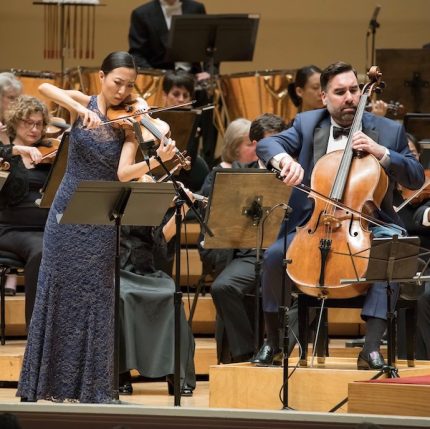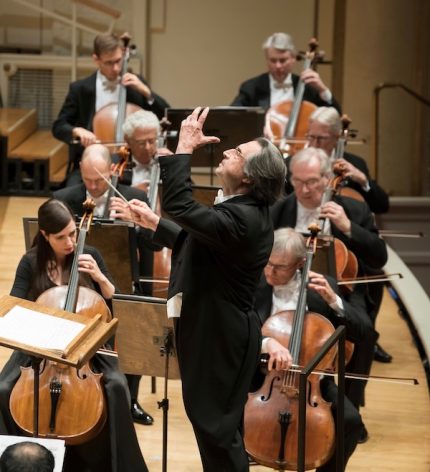Intimately scaled Brahms for two warms up a chilly night at CSO

Winter is coming. But it’s clearly already here in Chicago from a weather perspective, with the mercury diving into the low 20s on a bitterly cold Thursday night.
Serendipitously, the scheduled Chicago Symphony Orchestra program offered ideal musical comfort food—a Fleisch und Kartoffeln program of rich German fare to warm up Orchestra Hall.
Riccardo Muti led off the evening with the Overture to The Flying Dutchman, one of the conductor’s infrequent forays into music of Richard Wagner. A jarring horn blat disfigured the opening brass tutti of the Dutchman’s theme, but Muti whipped up suitable cataclysm in the storm music, the woodwinds imbued the sailors’ chorus with jaunty swagger, and English hornist Scott Hostetler floated Senta’s redemption theme with glowing tenderness.
The centerpiece was Brahms’ Concerto for Violin and Cello, with two CSO front desk members—associate concertmaster Stephanie Jeong and assistant principal cellist Kenneth Olsen—as the soloists.
Few concertos have a more intriguing backstory than Brahms’ “Double.” The caustic composer had alienated his close friend, violinist Joseph Joachim, over the latter’s messy divorce, and the two had not spoken for years. Brahms wrote the concerto—his final orchestral work—and sent it to the violinist as a reconciliation of sorts, which worked to the extent that Joachim played the work’s premiere (with cellist Robert Hausmann).
Though not directly programmatic, it’s not too hard to see the cello and violin lines reflecting Brahms and Joachim, respectively—the soloists conversing in jocular fashion, finishing each other’s phrases as good friends do, disputing gently and joining together in some of the concerto’s most heartfelt passages.
As in the Wagner overture, the concerto performance got off to a rough start with cellist Olsen smudging the first notes of his opening cadenza. The performance soon got on track. If the playing seemed a bit light in scale for this late 19th century music, it suited the performance, both soloists playing with a relaxed intimacy that communicated itself as surely as more outsized virtuosic approaches.
Olsen was especially inspired, after the initial lapse. The cellist played with technical poise and darkly burnished beauty of tone, drawing out lyrical phrases with a plaintive warmth that virtually defined Brahms in introspective mode.
At times one wanted more soloistic personality as well as greater body of tone from Jeong’s slender violin sound; while accurate technically her playing verged on faceless efficiency in the early going.
Fortunately, Olsen’s more direct response to the music seemed to get the violinist to loosen up as the performance unfolded. The simpatico duo brought seamless ardency to the Andante’s songful theme (set in octaves as if Brahms were saying he and Joachim remained friends in spirit even when they were separated). In the playful insistence of the finale, the soloists tossed phrases back and forth delightfully and brought rich expressive warmth to the lilting secondary theme.
Muti led a typically alert and sympathetic accompaniment, scaling down the music to Mozartian dimensions at times to suit the soloists’ intimate view of the score.

Schumann’s Symphony No. 3 “Rhenish” closed the evening. Muti brought his characteristic brand of vigor and textural transparency to Schumann’s most epic work in the genre, though his steely approach diluted some of the score’s essential warmth. The conductor was also in fussy mode for long stretches Thursday, over-marking dynamics and interior voices in a way that fitfully impeded momentum and drew attention to the conducting and away from the music.
The orchestra’s playing was energetic and responsive, a couple ensemble lapses in the first violins apart. David Cooper had one of his more consistent outings since taking the principal horn chair in July, with robust solo attacks and fewer technical slips.
Following intermission, three recently retired orchestra members were honored in a brief onstage ceremony with CSO president Jeff Alexander. Riccardo Muti presented the Theodore Thomas medallion to bassist Roger Cline and violists Daniel Orbach and John Bartholomew.
Also retiring and receiving the medallion but not present were assistant principal flute Richard Graef, cellist Jonathan Pegis, and bass Michael Hovnanian.
The program will be repeated 8 p.m. Saturday and 7:30 p.m. Tuesday. cso.org; 312-294-3000.
Posted in Performances



Posted Nov 09, 2019 at 3:08 pm by mary
“David Cooper had one of his more consistent outings since taking the principal horn chair in September, with robust solo attacks and fewer technical slips.”
Oh dear. Muti is not a pushover when it comes to granting tenure.
Posted Nov 10, 2019 at 8:14 am by Ellen Criz
Heard they gave a surprise honor to Dan Gingrich on Saturday. Honorary First Horn for Life. Well deserved.
Posted Nov 10, 2019 at 3:40 pm by Alan Goldberg
Not sure what the complaint is about Cooper’s playing. I attended Thursday night and most of the other programs this season and am finding his playing technically assured and gorgeous in tone.